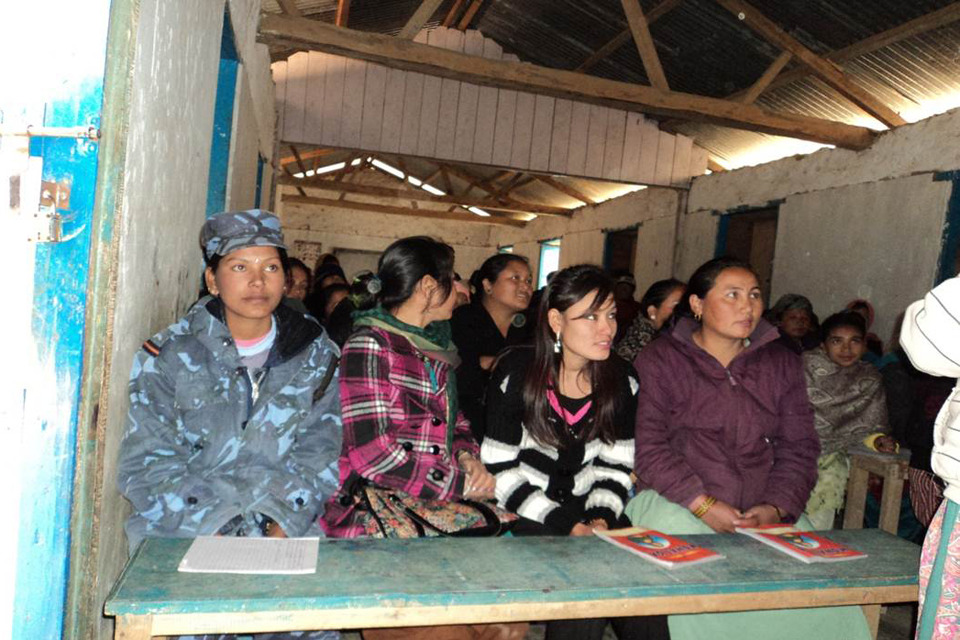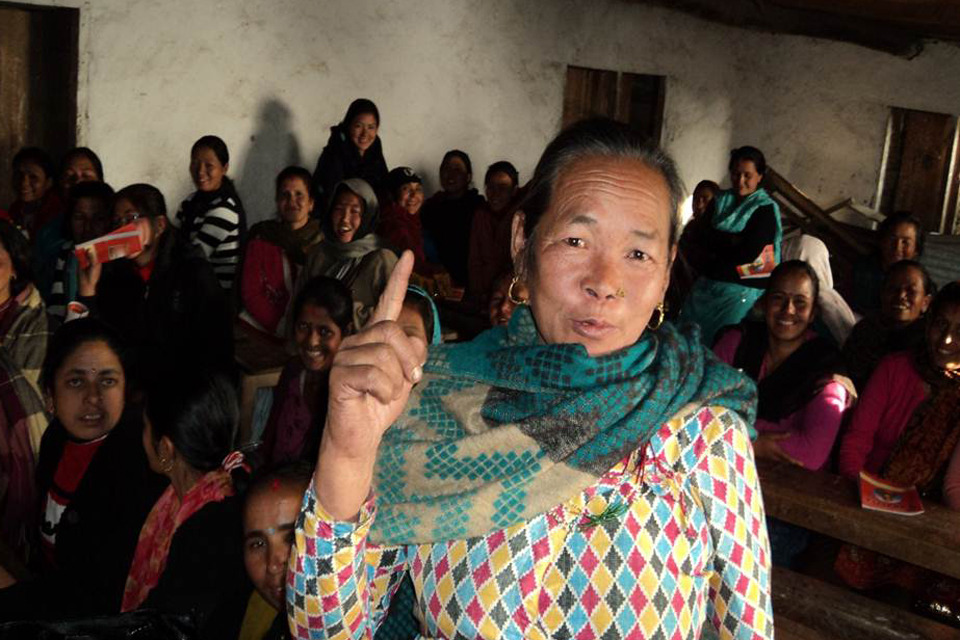Ending violence against women in Nepal
UK aid support provides help for poor and socially marginalised women in rural communities

Women like Radha Kunwar who are Para-Legal Committee members are helping rescue women suffering from violence in their communities. Picture: Malcolm Hood/DFID Nepal
Although physically challenged, 37-year-old Radha Kunwar is an active community leader. Being of short stature, she faced tremendous discrimination due to her disability from childhood. However, thanks to support from the UK aid funded Para-Legal Committee (PLC), Radha was given help to overcome her limitations. She now helps to rescue distressed women in her community in Kaski district, which notably has a high level of violence against women reported in the country. Recently she was instrumental in rescuing 12 young Nepali girls from being trafficked to Indian brothels.
“The courage, the confidence that I could muster to challenge the traditional male-controlled norms came from my exposure and participation in the paralegal programme for women’s empowerment”, says Radha. “The biggest achievement I am proud of is the rescuing of the 12 young girls who were going to be trafficked. This was possible thanks to the support extended by a number of men and women of my community.”
Stopping the violence

Para-Legal Committee training in Phungling VDC in Taplejung district. PLC invited female Nepal Police officials as participants for the training. Picture: UNICEF
Nepalese women, especially in rural areas, can face abuse, expoitation and violence including being raped, sold to brothels or being burnt to death. However, of late there has been evidence to suggest that the situation is noticeably improving.
UK aid from the Department for International Development has been supporting UNICEF over the last few years to run the women’s Para-Legal Committee project which helps to protect women and children – particularly those from poor and socially marginalised groups – from being abused, tortured and killed. Through the women’s PLC project, community level prevention and response mechanisms on ending violence against women and girls have remained active and effective across Nepal’s far-flung districts.
Diffusing domestic squabbles
“My husband and I used to quarrel quite a bit,” says Sangeeta Tamang, 22, of Barahachhetra village in Sunsari district in eastern Nepal. “But usually they used to be over small stuff, and we used to get over them quite quickly. But the last quarrel we had flared up into a major one!” This argument over a trivial domestic matter ended up with Sangeeta’s husband, Santosh, nearly beating her to death.
“When we went to visit her, she was quite a sight,” says Mamata Tamang, a member of the district paralegal committee. “Her face was swollen and discoloured and her head seemed pulpy.” Thanks to the intervention of the PLC elders in the area Sangeeta received treatment at a nearby hospital. As the norm with cases resolved by the PLC, Sangeeta’s husband received a verbal warning from the district PLC. They also helped him and Sangeeta with advice and therapy in their marriage. “Now we are living quite happily with my family. It’s all thanks to the PLC.”
Domestic violence issues are usually resolved through mediation by the PLCs but if the situation goes beyond their control, they then refer it to the local police.
Help for victims

A woman from a disadvantaged group aspiring to be selected as a PLC member and encouraging other young women to join. Picture: UNICEF
When Srijana Khanal (name changed) landed in India she had high hopes of gaining a good education. Her maternal uncle had convinced her mother to let her go to India where he would enrol her at a boarding school in return for help with his household chores. Sadly, he did not keep his word, instead abusing and raping Srijana repeatedly. Srijana managed to contact the paralegal committee with her meagre savings and was rescued. She is currently under medical treatment and making a complete physical recovery. Her emotional recovery will take much longer.
Sita Chaudhari, 20, and Bimala Gurung, 21, of Kumroj, Chitwan, were trafficked by their neighbour to Kolkata, India. They were initially put into work as domestic labour for a few days but were soon forced into commercial sex work. The two girls were able to make a phone call secretly to the PLC in Kumroj and let the members know what was happening to them. On the basis of this information, the PLC members and family members of the victims reported the case to the police and they were rescued. The PLC is now working to get the girls re-integrated into the community as they are facing discrimination.
With support from UK aid from the Department for International Development there is change taking place in Nepal in the fight against violence against women and girls. However, there is still miles to go before the victims of gender violence get proper justice and the violence and suffering ends.
Facts & stats
DFID approved the women’s empowerment and promotion of rights through paralegal committees programme in 2009 for three years with the aim of scaling it up nation-wide. From July 2012, the women’s paralegal programme is being transitioned into the women’s development program of the Government of Nepal.
The focus of the program is to protect women and children, particularly from the poor and socially excluded groups, from gender-based violence, abuse, exploitation and discrimination.
PLCs recorded 29,148 cases related to women and children during the programme period. 85% of cases were solved at the local level, and 15% referred to district level authorities for further action.
The members of the PLCs deal with a broad range of violence incidents, including domestic violence, sexual harassment, rape, trafficking, early marriage, witchcraft, property disputes and polygamy. Most commonly, the paralegal committees work towards increasing awareness on prevention of violence against women and girls and providing protection to victims/survivors of violence.
DFID Nepal also supports local NGOs such as SATHI to create awareness about violence against women and children at the community level.
DFID Nepal has provided support to the Office of the Prime Minister/Council of Ministers to coordinate the development of the National Gender based violence action plan.